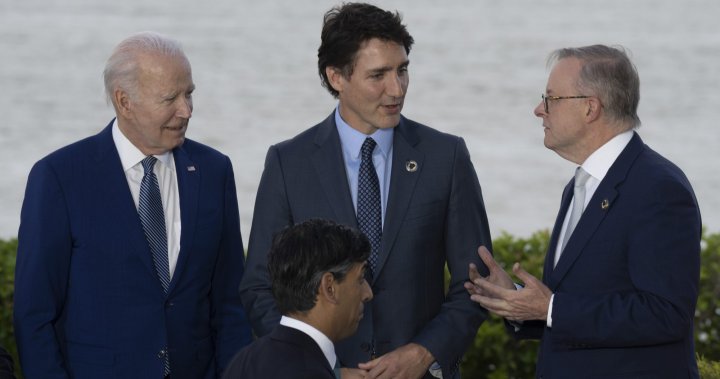Canada has once again found itself on the outside looking in after some of its closest allies — the United States, the United Kingdom and Australia — announced the next phase of their new AUKUS security pact this week.
AUKUS, formed by the three countries in 2021, is part of efforts to push back against China’s growing power in the Indo-Pacific region by focusing on military modernization through new technologies. The trio announced Monday it will begin consultations this year on collaborating with “prospective partners” around the world as part of its second phase, specifically mentioning Japan as an ally it is considering working with.
Not mentioned was Canada, despite the federal government saying it is considering joining the pact Prime Minister Justin Trudeau in 2021 described as “a deal for nuclear submarines, which Canada is not currently or any time soon in the market for.”
Speaking to reporters Monday as his government announced its long-awaited defence policy update, Trudeau said Canada was already talking with AUKUS members about working with the alliance and potentially even joining it as a member.
“I think it’s really important that allies, particularly across the Indo-Pacific, work together in stronger and tighter ways, and those Canadian conversations with our partners will continue,” he said.

But AUKUS members have already poured cold water on the idea of expanding the alliance beyond the core trio — and experts say even if that is possible, Canada is unlikely to be invited.
“The United States and Canada are already so closely aligned that AUKUS could become CANAUKUS pretty easily, but it’s not. That’s a choice,” said Richard Shimooka, a senior fellow at the Macdonald-Laurier Institute who studies defence policy.
What is AUKUS, and what does it aim to do?
The first stage, or “pillar,” of the AUKUS pact was focused on delivering nuclear-powered submarines to Australia, bringing its fleet in line with the U.S. and U.K.
The countries have signed agreements that will see the Virginia-class submarines built in the U.K. with a British design and a conventional U.S. weapons system onboard, at a cost of US$3 billion, with the first subs set to be delivered in the 2030s. A shared submarine technology platform, dubbed SSN-AUKUS, will also be developed and put into use within the next decade.
Breaking news from Canada and around the world
sent to your email, as it happens.
The second and broader pillar of AUKUS is focused on sharing military technology and co-operation in areas including quantum computing, artificial intelligence and cyber technology, with the ultimate goal of innovating their militaries in a collaborative way.
That will include engaging with international partners and allies on potential collaboration for individual projects and “regarding areas where they can contribute to, and benefit from, this historic work,” the alliance said Monday. It said collaboration opportunities will be identified based on factors including “technological innovation, financing, industrial strengths, ability to adequately protect sensitive data and information, and impact on promoting peace and stability in the Indo-Pacific region.”

Japan was singled out as a possible partner on advanced capabilities projects “because of its strengths and its close defense partnership with all three countries,” a Pentagon spokesperson said in a statement.
Shimooka said Japan brings technological advancements to the table “that would be extremely beneficial” to AUKUS, making them a natural choice for a potential collaborator.
But Australian Prime Minister Anthony Albanese clarified Monday that there were no plans to add a fourth member to the pact, and that any collaboration would be on a “project-by-project” basis.
“What is not proposed is to expand the membership of AUKUS,” he said at a news conference.
U.S. President Joe Biden and Japanese Prime Minister Fumio Kishida are expected to discuss potential AUKUS collaboration during Kishida’s state visit to Washington this week, the White House said Tuesday.
China has criticized the pact and said it could spark a regional arms race. A foreign ministry spokesperson said on Monday expanding AUKUS would destabilize the region and Japan should act cautiously on defence issues given its history.
Why isn’t Canada involved?
While Canada may end up collaborating closely with AUKUS in the future, Shimooka said it is simply not in a position to contribute as an equal partner even if it were asked to join.
“The whole point of AUKUS is to ensure the modernization of military systems to stay ahead of its adversaries,” he said in an interview. “Canada has not adapted to that well … and wouldn’t really be able to take advantage of it.”
As proof, Shimooka pointed to the very defence policy update Trudeau and his government announced on Monday.
While the policy commits another $8.1 billion over the next five years, that brings Canada’s defence spending to 1.76 per cent of GDP by 2030 — still below NATO’s threshold target of two per cent for its members. And the promised boosts to equipment, including new helicopters and submarines, don’t address long-standing issues with timely procurement or match the technological advancements being sought by AUKUS.

The updated defence policy calls for the purchase of conventionally powered submarines to replace the country’s four Victoria-class submarines, which will reach the end of their lifespan in the mid-2030s. But the cost of buying those new submarines is not yet calculated, Trudeau said, which means the spending total is sure to go up.
The prime minister left the door open Monday to a nuclear-powered option, telling reporters the government still needs to determine what type of submarines are “most appropriate” for protecting Canadian sovereignty in the Arctic. That could present an opportunity for collaboration with AUKUS if Canada decides to go nuclear.
The defence policy update focuses not just on Arctic security, but also on the growing issue of cyberattacks and technological warfare — and the threat posed by China, Russia and other hostile actors in those spaces. The Canadian Armed Forces has also been working to build out its cyber capabilities, which were a major component of the last defence policy update in 2017 and which will see the military work alongside the Communications Security Establishment, the country’s foreign signals intelligence agency, which is governed under the National Defence Act.
But Shimooka says such announcements aren’t forward-looking and only serve to catch Canada up to where AUKUS members already are.
He said not being invited into the alliance is a “psychic wound” that is likely still haunting Ottawa.
“We want to be a part of these alliances, we want a seat at that table,” he said. “But the simple fact of the matter is, allies do not see Canada as useful for these more modern-minded alliances.”
— with files from Reuters and The Canadian Press




